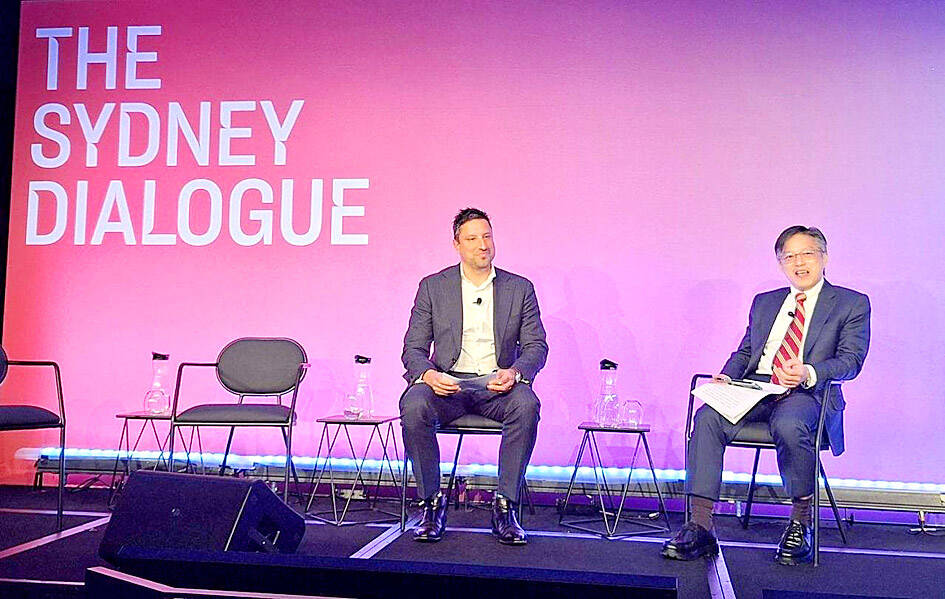Taiwan is an excellent partner for Australia on cybersecurity issues, Australian Ambassador for Cyber Affairs and Critical Technology Brendan Dowling said on Monday.
Dowling made the remarks during the Sydney Dialogue, an annual policy summit hosted by the Australian Strategic Policy Institute.
This year, a Taiwanese delegation led by National Security Council adviser Lee Yuh-jye (李育杰) attended the event focusing on cybersecurity and emerging technology issues.

Photo courtesy of the Ministry of Foreign Affairs
The summit featured industry experts, government officials and academics from 30 countries — including Taiwan, Australia, Japan, Lithuania, the Netherlands, Papua New Guinea, the Philippines, Singapore, Tonga, the UK and the US. Discussions centered on topics such as artificial intelligence (AI) development, hybrid threat management, digital infrastructure in the Indo-Pacific region, economic resilience, digital innovation, democracy and disinformation.
As part of a session on designing technology for democracy, Lee and Dowling had an in-depth conversation on Taiwan’s position in AI supply chains and how to use technology to protect democracies from threats such as disinformation.
Dowling called Taiwan an excellent partner for Australia when it comes to cybersecurity issues due to its democracy, as well as its insistence that “cybersecurity is national security” amid a tense geopolitical environment.
Lee said that although The Economist has called Taiwan the “most dangerous place on Earth,” the country’s democracy has become more resilient in the face of wide-ranging threats, from natural disasters to incessant cyberattacks.
He also discussed how Taiwan’s tech industry prioritizes human rights in real-world applications, such as how social distancing apps deployed during the COVID-19 pandemic sought to protect user privacy.
Taiwan is also a vital link in AI, with key industry players such as Taiwan Semiconductor Manufacturing Co and Quanta Computer Inc, he said, adding that “Taiwan” cannot be spelled without “AI.”
Every country needs its own AI infrastructure, and cannot rely on others, Lee said, citing ChatGPT’s use of simplified Chinese characters and Baidu’s Ernie Bot as potential national security risks to Taiwan.
China could use AI programs to better understand Taiwan or leverage algorithms to influence Taiwanese society, he said.
Taiwan has developed its own large-scale language model, the Trustworthy AI Dialogue Engine, he said.
To achieve AI sovereignty, Taiwan would continue to promote educational and technological initiatives, increasing its democratic resilience, he said.
Representative to Australia Douglas Hsu (徐佑典), Ministry of Digital Affairs Deputy Director for Cyber Security Cheng Shin-ming (鄭欣明), National Institute of Cyber Security Vice President Lin Ying-dar (林盈達) and Director of Cybersecurity Technology at the Institute for Information Industry Mattel Hsu (許建榮) also attended.

Taiwan is to commence mass production of the Tien Kung (天弓, “Sky Bow”) III, IV and V missiles by the second quarter of this year if the legislature approves the government’s NT$1.25 trillion (US$39.78 billion) special defense budget, an official said yesterday. Commenting on condition of anonymity, a defense official with knowledge of the matter said that the advanced systems are expected to provide crucial capabilities against ballistic and cruise missiles for the proposed “T-Dome,” an advanced, multi-layered air defense network. The Tien Kung III is an air defense missile with a maximum interception altitude of 35km. The Tien Kung IV and V

The disruption of 941 flights in and out of Taiwan due to China’s large-scale military exercises was no accident, but rather the result of a “quasi-blockade” used to simulate creating the air and sea routes needed for an amphibious landing, a military expert said. The disruptions occurred on Tuesday and lasted about 10 hours as China conducted live-fire drills in the Taiwan Strait. The Civil Aviation Administration (CAA) said the exercises affected 857 international flights and 84 domestic flights, affecting more than 100,000 travelers. Su Tzu-yun (蘇紫雲), a research fellow at the government-sponsored Institute for National Defense and Security Research, said the air

Taiwan lacks effective and cost-efficient armaments to intercept rockets, making the planned “T-Dome” interception system necessary, two experts said on Tuesday. The concerns were raised after China’s military fired two waves of rockets during live-fire drills around Taiwan on Tuesday, part of two-day exercises code-named “Justice Mission 2025.” The first wave involved 17 rockets launched at 9am from Pingtan in China’s Fujian Province, according to Lieutenant General Hsieh Jih-sheng (謝日升) of the Office of the Deputy Chief of the General Staff for Intelligence at the Ministry of National Defense. Those rockets landed 70 nautical miles (129.6km) northeast of Keelung without flying over Taiwan,

City buses in Taipei and New Taipei City, as well as the Taipei MRT, would on Saturday begin accepting QR code payments from five electronic payment providers, the Taipei Department of Transportation said yesterday. The new option would allow passengers to use the “transportation QR code” feature from EasyWallet, iPass Money, iCash Pay, Jkopay or PXPay Plus. Passengers should open their preferred electronic payment app, select the “transportation code” — not the regular payment code — unlock it, and scan the code at ticket readers or gates, General Planning Division Director-General Liu Kuo-chu (劉國著) said. People should move through the